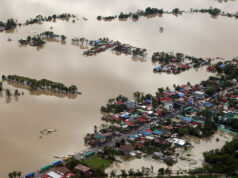MPIC looks to build LNG terminal
By Victor V. Saulon, Sub-Editor
METRO PACIFIC Investments Corp. (MPIC) has joined local and foreign companies that have signified their intention to build a liquefied natural gas (LNG) import terminal ahead of the depletion of the country’s lone source of the fossil fuel — the Malampaya offshore gas field.
“We’re studying that,” MPIC Chairman Manuel V. Pangilinan told reporters after the quarterly media briefing on Monday of Manila Electric Co. (Meralco), the distribution utility which he also chairs.
Asked about the target completion date of the study, he said: “Maybe early next year.” He said should the group decide to pursue the project, it would be undertaken “between Meralco and MPIC.”
Mr. Pangilinan said he wanted the LNG import terminal to be started “as soon as feasible.” He said the urgency of putting up the facility is dictated by the time it takes to complete its construction.
“It takes minimum three years to build a gas terminal… minimum 10 years to build a gas field. So we are slowly hitting the wall if we don’t move,” he said.
Natural gas, said to be the cleanest fossil fuel, is transported through a pipeline. But if the deposit is large and the market is overseas, the gas may be liquefied for ease of shipping and moved through specialized tankers. Imported LNG is then regasified or reverted to its former state in the country of destination.
Mr. Pangilinan said the country should be aware that building an LNG import terminal is just a means to an end. Its main users are the existing local gas-fired power plants.
At present, the country’s natural gas supply comes from the Malampaya gas field off the coast of Palawan province. Five gas-fired power plants in Batangas province, with a combined capacity of 3,211 megawatts (MW), are the main customers of the fuel source, which is expected to be depleted by 2022 to 2024.
Mr. Pangilinan said a number of questions should be answered before putting up an LNG terminal, including its cost, how it would translate into power rates, and how the fuel will be transported to the power plants and into the market.
He said determining the capacity of the LNG terminal is “complicated.”
“We do know the likely demand of the Philippines will be for the next 15 years, the question is, what’s the mixture of fuel sources [that] will meet the demand in the next 15 years,” he said.
“Our estimate is the demand is currently 15-16,000 MW of consumption,” pointing to Meralco’s power demand data.
The distribution utility placed demand for electricity within its franchise to have peaked so far this year at 7,399 MW on May 23. Luzon’s peak demand so far this year is at 10,876 MW, which was registered on May 28.
“We expect that to double at a certain assumption on economic growth of the Philippines,” Mr. Pangilinan said. “So we need another 15-16,000 [MW] plus any new plants that need to be built to provide us adequate margins. At the moment, margin is not adequate. So you have to build X thousand MW.”
“The question is, [what] fuel source is the most efficient. Paramount [to that question] is the cost to consumer,” he said.
“The industry alone cannot decide on the mix. The government has a big say. They will approve the power plants and the costs to produce,” he said, adding that the industry and the government should hold a “dialogue” to arrive at answers.
Asked about whether the MPIC group had informed the Department of Energy (DoE) about the LNG plan, he said: “[We are] about to. We have to prepare our own brief.”
In June, the DoE said it was expecting to start receiving towards the end of 2018 firm proposals from the local and foreign companies that are keen on putting up an integrated facility for imported LNG. It earlier said about 11 investors had come forward to express their interest in building the facility.
MPIC is one of three Philippine units of Hong Kong based First Pacific Co. Ltd., the others being Philex Mining Corp. and PLDT, Inc. Meralco’s controlling stakeholder, Beacon Electric Asset Holdings, Inc., is partly owned by PLDT.
Hastings Holdings, Inc., a unit of PLDT Beneficial Trust Fund subsidiary MediaQuest Holdings, Inc., has interest in BusinessWorld through the Philippine Star Group, which it controls.



